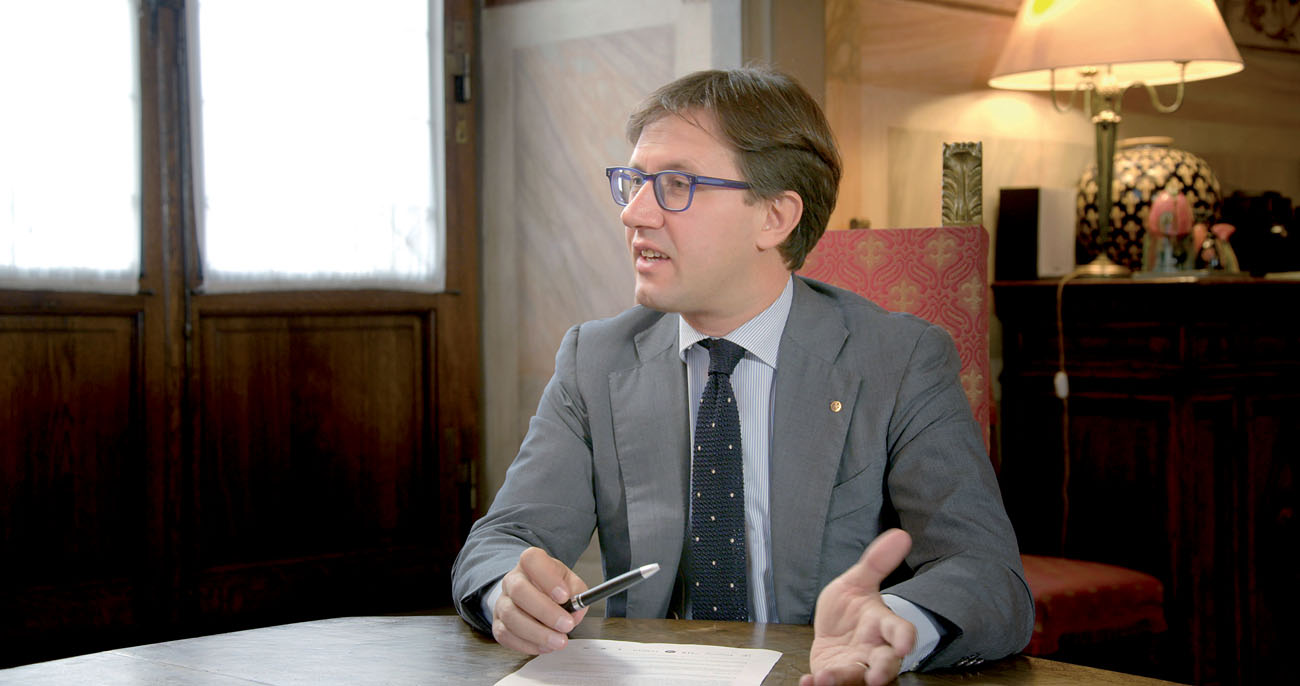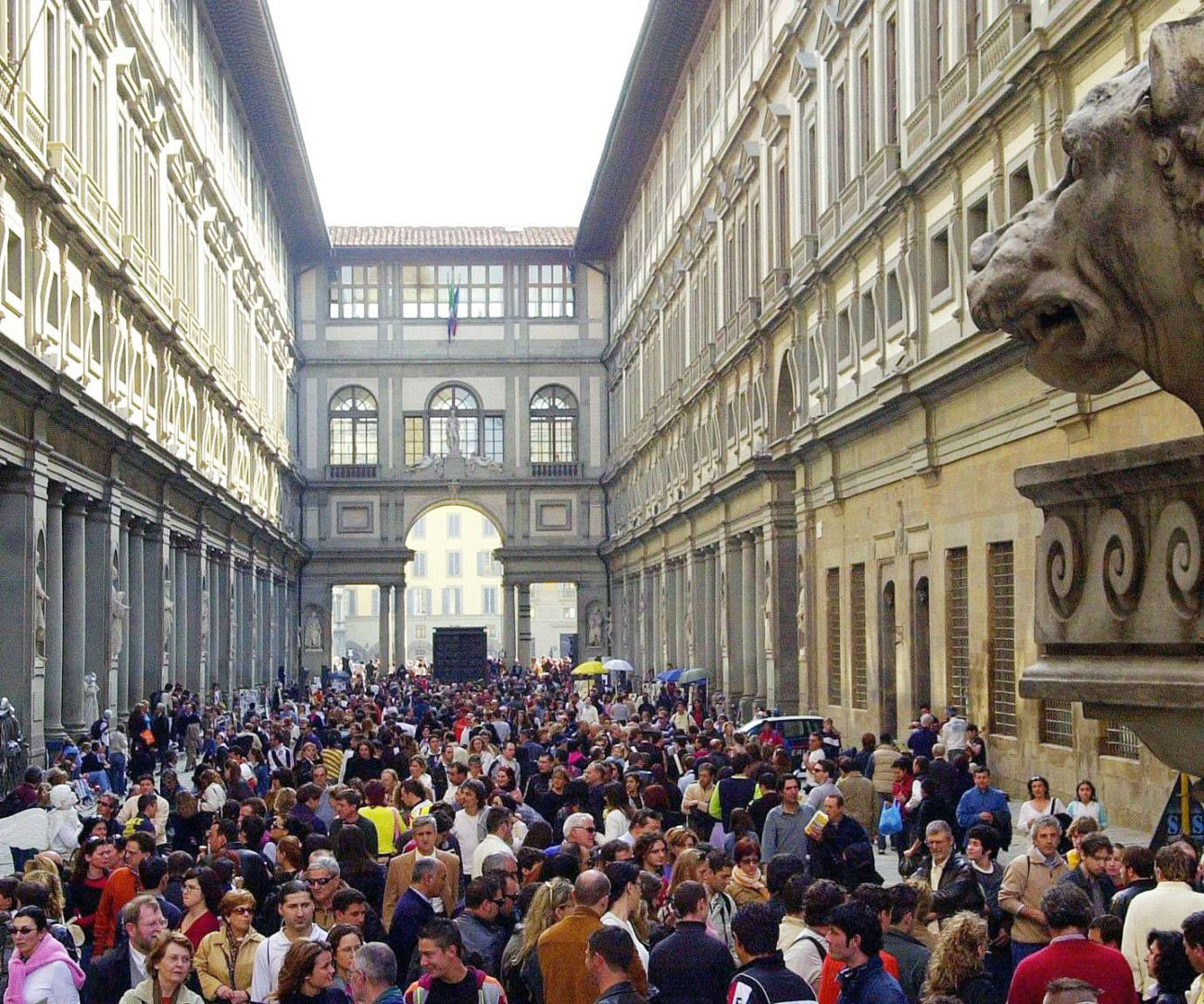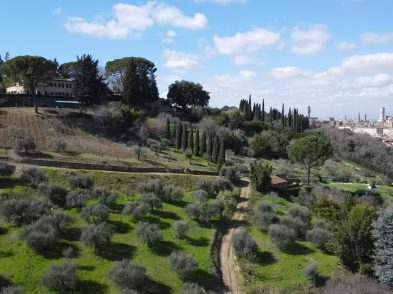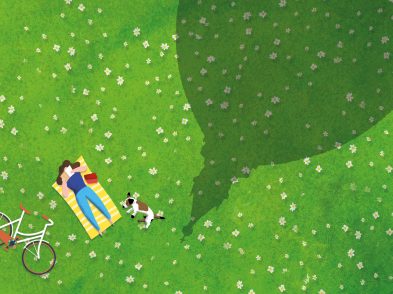The Florentine recently spoke with the Mayor of Florence Dario Nardella in the Palazzo Vecchio’s sumptuous Sala di Clemente VII about a wide range of issues, from being voted the best mayor in Italy to Theresa May’s Brexit speech in Florence, his response to recent rape accusations of two American students by on-duty Carabinieri officers and the city’s plans to cope with mass tourism.
Ph. Sandro Nardoni | Watch Part 1 of the interview in video format here
Helen Farrell: I see you have a pen from 10 Downing Street, which I imagine was given to you as a present?
Dario Nardella: It was a gift from the British Prime Minister Theresa May, who recently came to Florence to give her Brexit speech. It was an important moment that saw Florence take centre stage, not only from an historical standpoint but also in current affairs. The Prime Minister referred to Florence as the historic heart of Europe. When I met Prime Minister May, my words to her were that I hoped she would draw inspiration from this city, which has always been a city of dialogue. Therefore, I hope, as an Italian and a European, that the Brexit decision isn’t a definitive one, but that the roads of Europe and the United Kingdom will return to meet one another very soon. This is not the time for divisions for our societies. We must be more united.
HF: Congratulations on being voted Best Mayor in Italy in a recent survey. You have been Mayor of Florence for over three years. What do you consider to be the highlights of your term to date? And what are you determined to accomplish before May 2019?
DN: In these last three years, thanks also to the work carried out by my predecessor Matteo Renzi we have been able to unfreeze all of the city’s major projects. I’m referring to the implementation of Florence’s structural plan, the conversion of much publicly and privately owned real estate that had been left derelict or unused, such as San Firenze, which has become the Zeffirelli Museum, the new Opera del Duomo Museum, the reopening of the Niccolini Theatre and the old Carabinieri barracks at Santa Maria Novella, where Prime Minister Theresa May made her speech. We have also unfrozen important public projects, including the two tramlines. We aim to finish the work by February to have the tram fully operational in the spring, transporting at least 37 million passengers a year across the entire tram network, which will revolutionize the city’s transport system. Lastly, we have introduced many changes regarding mobility, with new services like bike sharing and electric car sharing, suitable for a city like Florence, which is small with pedestrianized zones. It’s only right that the city should be respected in terms of pollution and mobility.
For the next two years we have lots of plans in addition to finishing the tram network. We want to start work on the new runway at the airport, which will improve European connections and nearby continents. We also want to start on the new general market and for the stadium, of great interest for football fans, in the northwest part of the city, in Novoli.
HF: Florence introduced anti-terrorism measures after the summer. What further measures will be taken and can you explain the #Florencecalling project?
DN: Like all Italian cities, we have had to apply anti-terrorism measures after the attacks in London, Paris and Barcelona. These consist in the presence of special anti-terrorism forces and informing citizens so that they are able to collaborate with the police, notifying them about potentially risky situations, as well as installing a series of anti-ramming barriers against vehicle-led attacks, such as in Berlin, Nice and Barcelona. But if we put barriers and barbed wire around our cities, constructing checkpoints, we will turn our cities into military camps. We would do nothing other than suffer the threat of terrorism, which aims to reduce us into closed and frightened societies. The challenge we face is to apply these security measures but with intelligence, respecting the beauty and history of our city. Not concrete barriers but big, heavy and robust pots planted with trees and flowers. Not barbed wires, mesh or gating, but the presence of the police and the army, as well as objects attentive to the urban setting. This is why we have launched an international call for ideas open to designers, planners and architects to help us find the best solutions, which satisfy the need for anti-terrorism measures to protect our city’s piazzas but without denuding the beauty, historical and architectural authenticity of our city. This is a challenge faced by many European cities. Undoubtedly in the coming years these cities will have to adapt to the risk of terrorism but they should never be forced to give in. Our cities should never be forced to bow to terrorists. We must continue to live our lives in public spaces, with peace of mind and with the awareness of being more careful and watchful to prevent attacks that represent a risk for our communities.
HF: Florence’s international community is still in shock by the recent rape accusations of two American students by on-duty Carabinieri officers and is still angered by words that you were quoted as saying: “it is important that American students learn, with the help of the universities and our institutions, that Florence isn’t a city of excess… I would like them to be more integrated into the cultural life of the city.” Could you clarify these words and explain what the Comune is doing to spread a culture of safety and cultural integration?
DN: First of all, I’d like to say that my comment on the incident was very clear and unambiguous. I condemned this very serious episode, in the knowledge that it could have taken place in any city in Italy because this is not a problem specific to Florence. It’s very serious that two police officers in uniform can take advantage of two girls and even more serious that this occurred while the girls were under the influence of alcohol, hence more vulnerable. I hope that this goes through the courts quickly and that those culpable face appropriate punishments in the eyes of the law. We are so involved in this incident that a few days after it occurred I decided to bring a civil action as the City of Florence in the legal proceedings, to be close to the two girls and their families, a mark of solidarity. Our thoughts are with them above all else. We will follow the proceedings, ensuring that they are transparent and defending the image of our city, our international universities because we have a fantastic relationship with them.
That sentence you quoted was an answer to a journalist’s question. It was not my comment on the incident. Instead it was the reply about a situation that we have in this city: alcohol abuse among young people, all young people. Here in Italy you can start drinking at age 16. American students, who live in a country where the laws on alcohol abuse are far stricter, when they arrive in a country that they don’t know, in a city like Florence, may find themselves particularly exposed to problems associated with alcohol abuse. So, my concern, as Mayor, is to guarantee the health of our young people, regardless of nationality.
To this end, over the years, on many occasions, we have met with the directors of American schools, implementing projects prior to this sad incident involving the two police officers. For instance, meetings with administrators at American universities, internship programs to allow foreign students to experience the cultural and institutional lifeblood of our city, initiatives connected to caring for Florence—American students have a special sense of civic responsibility. We’ve organized days to clean up our streets and gardens, parks and riverbanks to “take care” of Florence. We will continue to develop these initiatives. Indeed, a few days ago, we met with the school directors together with the police.
I believe that when two uniformed police officers rape two girls (it will be up to the legal proceedings to ascertain the culpability), it is not an issue of safety but a very different problem, an even more serious issue, which must not be underestimated. Which is why I appreciated the initiative also taken by the Carabinieri to intensify relations with the schools, so that the students continue to trust the police and so that the grave actions of two police officers are not allowed to compromise the image of the Carabinieri, which in my experience as Mayor is an exceptional institution, always present and ready to lend a hand.
Regarding the safety of students, both Italian and foreign, we have decided to implement new initiatives such as a dedicated transportation system, financed by the most appropriate means. This will allow students to enjoy the city’s nightclubs and get home safely again. As a father of three, I believe you can have fun while keeping a clear head and good judgment. It is our responsibility to educate all young people on how to have fun while staying safe.
HF: Do you consider mass tourism to be a problem in a city that lives off tourism? What’s the Comune’s plan on dealing with mass tourism?
DN: Tourism always brings big opportunities. I like to say that tourism is the industry of peace. When countries are at peace, when there’s no terrorism or no wars, citizens feel freer to travel and visit new cities. This recent freedom has been made possible thanks to higher incomes and cheaper flights. Tourism is important as a way of sharing beauty and world heritage among all peoples. I’m a tourist, like you. We all love to travel and visit new cities, which is why it’s a positive thing that Florence is visited because it’s a way for humanity to share this beauty. Aside from this precept, it’s clear that the sustainability of tourism in a small city this fragile and this rich in monuments, artworks and historic buildings must be addressed. To respect this sustainability of tourist flow, we must invest in quality tourism, in building a better informed and careful demand. This means inviting visitors, who come from all over the world to visit Florence, to really get to know the city: to stop for longer than one or two days, go to the theatre, visit museums, get to know the lesser-known areas, not just the city centre, the Uffizi and Palazzo Vecchio and the Accademia, but also the many museums scattered in the suburbs, and even in the provinces. To become acquainted with the city’s real traditions and with Florentines. This is why we have already implemented policies that discourage “here today, gone tomorrow” tourism, the masses of tourists who come to the city for a few hours, who damage the city’s sustainability. Instead we encourage a more conscious and cultured and even a younger tourism, people who respect the city and who experience it for longer. It’s not easy because it’s unimaginable to put gates or walls around Florence. Sometimes, in Italy, we talk about putting a cap on entrance numbers, but it’s physically difficult to restrict entry into piazzas and city streets. By definition, a city is open to the public. But we can work on the tourism demand through major travel agencies and cultural offerings, attracting a certain type of tourism. Tourism isn’t a random phenomenon. The demand depends on the supply. If we offer experiences based on culture, art and theatre, on opportunities to experience the authentic values of this city, its traditions, good food and the people, I believe we will have tourism that is more attentive to our city’s beauty and ultimately more respectful.
HF: I understand that you recently took part in a round table about smart cities in Morocco. What was discussed and what will be applied to Florence?
DN: The visit to Morocco is part of a policy of international promotion and relations among Mediterranean cities. We have developed a close collaboration with Tunisia and have held important meetings with other cities in the Mediterranean like Tel Aviv and Beirut, and most recently in Morocco. This is because I would like to reintroduce that ambitious project that Mayor Giorgio La Pira had, back in the mid twentieth century: to build a big Mediterranean community, a peaceful response to violence, war and terrorism, focusing on culture, relations between peoples, dialogue among cities and the sharing of economic and social opportunities. The City of Florence seeks to offer what it has to other Mediterranean cities. With Tunis we have developed cultural cooperation and tourism promotion projects. With Morocco, in particular the city of Fes, which has been twinned with Florence since 1961, we have invested in training. The University of Florence has allowed the creation of a department of architecture with Italian professors at the new Euro-Mediterranean University of Fes to give young Moroccans opportunities for professional growth in their country. This is the main objective, which represents a challenge for us: to help emerging countries to construct a lasting and stable cultural and economic model. I believe in cooperation and development among cities, which have a universal vision and which have always had a tendency toward peace and not war.










